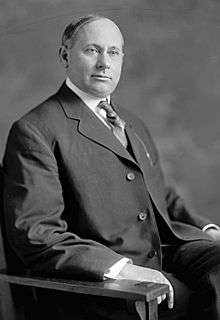Thaddeus H. Caraway
| Thaddeus H. Caraway | |
|---|---|
 | |
| United States Senator from Arkansas | |
|
In office March 4, 1921 – November 6, 1931 | |
| Preceded by | William F. Kirby |
| Succeeded by | Hattie Caraway |
| Member of the U.S. House of Representatives from Arkansas's 1st district | |
|
In office March 4, 1913 – March 3, 1921 | |
| Preceded by | Robert B. Macon |
| Succeeded by | William J. Driver |
| Personal details | |
| Born |
October 17, 1871 Springhill, Stoddard County, Missouri |
| Died |
November 6, 1931 (aged 60) Little Rock, Arkansas |
| Political party | Democratic |
| Spouse(s) | Sen. Hattie Caraway |
| Children | Paul Caraway; Forrest Caraway; Robert Caraway |
| Alma mater | Dickson College |
Thaddeus Horatius Caraway (October 17, 1871 – November 6, 1931) was a Democratic Party politician from Arkansas who represented the state first in the U.S. House of Representatives (1913–1921) and then in the U.S. Senate (1921–1931).
Caraway was born on a farm near Springhill, Stoddard County, Missouri, the youngest of three children. His father, Tolbert Caraway, was a country doctor and Confederate veteran; his mother was Mary Ellen Caraway.[1] When he was 6 months old, his father was assassinated in a feud, leaving his family impoverished. He worked as a farmhand from age 7, then later as a railroad section hand, a farm tenant, and as a sharecropper. He studied at night and attended the common schools as a boy.[2]
In 1883 he moved with his parents to Clay County, Arkansas; in 1896 he graduated from Dickson College in Tennessee, and taught in country schools until 1899. He studied law, and was admitted to the bar in 1900, beginning practice in Osceola, Arkansas; later that year he moved to Lake City, Arkansas, and in 1901 he moved again, to Jonesboro. Each time he continued his practice. In 1902, he married Hattie Wyatt, whom he had met at Dickson College. Together they had three children, Robert Easley, Forrest, and Paul Wyatt.[1][2]
From 1908 to 1912 Caraway served as the prosecuting attorney for the state's second judicial circuit.[2] He was elected to Congress in 1912 from the Arkansas's 1st congressional district, taking office as a representative in 1913 and serving until 1921. Rather than seek renomination in 1920, he chose to run for the Senate as a Wilson Democrat, and won; he was reelected in 1926.[3] That same year, he purchased Riversdale at Riverdale Park, Maryland.
In Congress, Caraway was a progressive and a reformer.[1] He was a vocal critic of the Harding administration and the Teapot Dome scandal and he chaired a worked for laws requiring disclosure of activities by lobbyists. He co-authored the McNary–Haugen Farm Relief Bill which would have provided price supports for farm products, although it was vetoed by President Calvin Coolidge. He supported American entrance into the League of Nations, bonuses for World War I veterans, as well as the Eighteenth (Prohibition), Nineteenth (Women's Suffrage), and Twentieth (Lame Duck) amendments.[2][4] On May 15, 1921 he introduced a bill to prohibit the enlistment of African-Americans in the US Army and US Navy. Furthermore, during the 66th Congress Caraway offered H.R. 8112, which proposed segregating public and private transportation in Washington D.C. During the same Congress, Caraway sponsored H.R. 8113, which directed the "Commissioners of the District of Columbia to set apart certain sections, streets, blocks, or parts of blocks of the District of Columbia in which shall reside members of the Negro race only, and other sections... in which members of the Negro race shall not reside..."
He served until his death, which was due to a blood clot in his coronary artery; he died in Little Rock on November 6, 1931, and lay in state in the Arkansas State Capitol on November 8. He is buried in Jonesboro. His widow, Hattie Caraway, was appointed to fill his seat by Governor Harvey Parnell, and was later elected to fill out his term, becoming the first woman elected to the Senate and only the second to ever serve as a senator.[5]
Literary Connection
Despite Caraway's admirable accomplishments, during his early days as a Senator he also gained national prominence for being a "modest and self-contained" man; a politician with "the shortest sketch in [the] Congressional Directory." And the headline of a story detailing this distinction was later found pasted in the personal scrapbooks kept by iconic American author F. Scott Fitzgerald, whose masterwork The Great Gatsby is narrated by Nick Carraway, a protagonist whose surname was originally spelled "Caraway" in Fitzgerald's earliest draft of the Gatsby novel.[6]
References
- 1 2 3 "Thaddeus Horatius Caraway (1871–1931)". The Encyclopedia of Arkansas History & Culture. Retrieved February 17, 2010.
- 1 2 3 4 "Senator Caraway Dies in Hospital". The New York Times. November 7, 1931. p. 1. Retrieved February 17, 2010.
- ↑ United States Congress. "CARAWAY, Thaddeus Horatius (id: C000139)". Biographical Directory of the United States Congress.
- ↑ "Double-Barreled Attack on "Lame Ducks"". The New York Times. February 1, 1925. p. XXI. Retrieved February 17, 2010.
- ↑ Magdalena E. Thorne. Women in Society: Achievements, Risk, And Challenge. Nova Science Publishers, 2004. ISBN 978-1-59033-942-8; p. 14
- ↑ Churchwell, Sarah (2014). Careless People: Murder, Mayhem and the Invention of The Great Gatsby. New York: The Penguin Press. p. 119. ISBN 978-1-59420-474-6.
| Wikimedia Commons has media related to Thaddeus Caraway. |
| United States House of Representatives | ||
|---|---|---|
| Preceded by Robert B. Macon |
Member of the U.S. House of Representatives from Arkansas's 1st congressional district March 4, 1913 – March 3, 1921 |
Succeeded by William J. Driver |
| United States Senate | ||
| Preceded by William F. Kirby |
U.S. Senator (Class 3) from Arkansas March 4, 1921 – November 6, 1931 Served alongside: Joseph T. Robinson |
Succeeded by Hattie Caraway |

